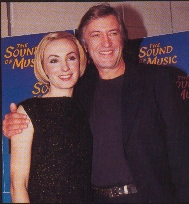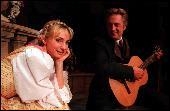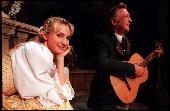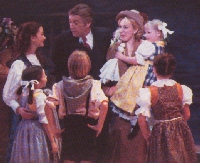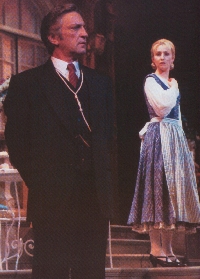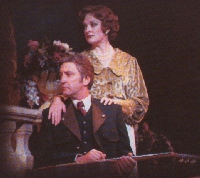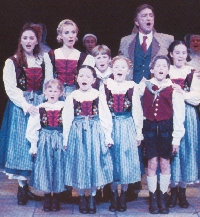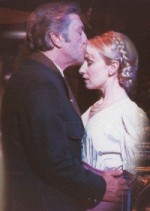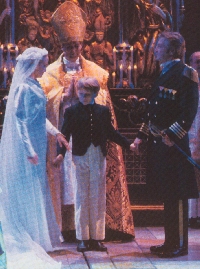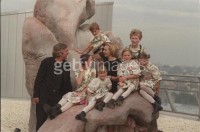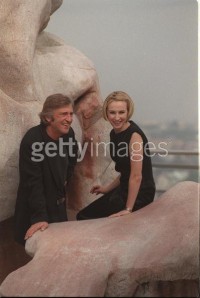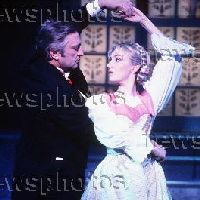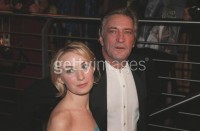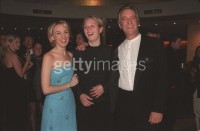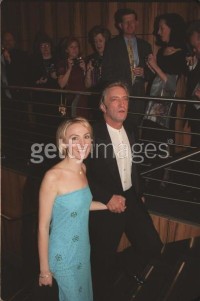Here's a sound musical. By: ANDREW CLARK. 27th March 2000
More than 40 years after its first Broadway smash, a new Melbourne production of Rodgers and Hammerstein's The Sound of Music is a triumph.
Lisa McCune, well known to commercial television soap watchers, is a revelation as Maria. Her presence, voice, supple movements, facial mobility, energy and charm, and her evolution into a more sensual woman - aware and somewhat confused by her power - persuade us that she can enlarge the life of Captain Georg Von Trapp.
A former Austrian naval hero, and a widower turned rich martinet, played by John Waters, Von Trapp is captured by Maria's music, her intoxication with their alpine locale, her gift for inspiring his seven children, and - though it at first dismays him - her independence. And despite its occasional cloying quality, there is also a theme - beyond that of redemptive love - of refusal to countenance evil.
This refusal gives substance to the original musical. On a moral scale, there are three levels - Maria and Captain Von Trapp, who reject evil; and Else Schraeder (Anne Wood), the voluptuous and sophisticated socialite, and Max Detweiler (Bert Newton), who both make a Mephistophelian bargain with the approaching Nazi Anschluss, which forcibly joins Austria to Germany; and Franz the butler (James Wright) and Herr Zeller (Paul Dawber), the Nazi turncoats. Then there is Rolf Gruber, the young postman, also a Nazi agent, but one who with a hint of ambivalence in a musical that does not feature character complexity. Rolf is a Nazi but is also smitten by Liesl, Von Trapp's oldest daughter, and he in effect saves the family from capture, leading to their escape across Maria's beloved mountains.
This is where the new production, which originated in New York in 1998, but which now features a fully Australian cast, has managed to achieve a more satisfying balance than that film. For all her charm, perfect diction and beautiful voice, Julie Andrews is somehow less persuasive as a Maria who could not only capture Von Trapp but understand the grave issues they face. This skewed the Julie Andrews version towards the fun-joy-and-love side of what is arguably the world's most loved musical, a tilt that underwrote the film's extraordinary following.
But Ms McCune is made of feistier stuff. A stronger Maria - and a stronger musical - is the result. This sense emerges in the opening scene, set in the Nonnberg Abbey, where Maria is a postulant. Waves of mist run through the dark cloisters as the Mother Abbess, played with charm and authority by Eilene Hannan, joins Sister Margaretta (Susan-Ann Walker), Sister Berthe (Angela Johnson) and Sister Sophia (Carolyn Ferrie) in singing a beautiful version of Preludium.
When we move on to that famous scene of Maria singing The Sound of Music, McCune immediately raises the energy level and stamps her authority on the audience. By the time the scene switches to Von Trapp's Hapsburg mansion, where Maria has been appointed governess after the shrewd and perceptive Mother Abbess decides she is not ready to take her full orders, the ensemble strength of this production becomes apparent. This is despite the rapid emotional jump-edit between scenes - from Maria being crestfallen at having to leave the abbey, to her excitement about her new adventure.
Like all great musical performances, this is one in which the arrangement, set design, lighting and sound all play crucial roles in setting the mood, enhancing the acting and singing, and fostering a sense of magic. Peter Casey's musical direction and Heidi Ettinger's set design, combined with Catherine Zuber's costumes and Paul Gallo's lighting, generate a colorful stage that encourages flamboyance and risk-taking. They communicate the sensuality and style that were such a feature of the Hapsburg mode, but one that is often absent from other productions.
As Von Trapp, John Waters' gravitas and shy grief, barely suppressed by his control-freak behavior with his children, are impressive. This changes into confusion, then renewed humanity, as a result of Maria's influence. The scene in which Von Trapp and his near-affianced Viennese socialite, Else Schraeder, realise they have reached an emotional fork is charged. Where Waters falters is in his voice, which lacks the texture to carry off such numbers as The Sound of Music and Edelweiss with conviction.
The Von Trapp children succeed in giving the musical its sense of freshness and joy, particularly in the bedroom scene with McCune doing a masterly performance of My Favorite Things.
This leads to another television import. As the opportunist Max Detweiler, who adjusts with little apparent difficulty to the Nazis' new order, Bert Newton brings a panto flavor to the role. Dressed like a middle-European version of Minnesota Fats in double-breasted suits, but with oddly buffed-up hair, Bert, you feel, knows all the moves, but still the audience enjoys the well-practised ride. In the the penultimate scene, in which he MCs the Von Trapp family singers before Austria's new Nazi patrons, there is even a hint of Mel Brooks.

